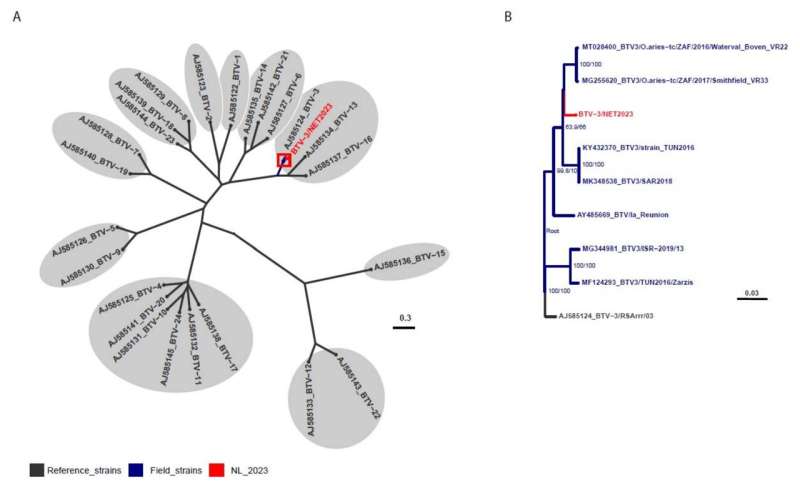This article has been reviewed according to Science X's editorial process and policies. Editors have highlighted the following attributes while ensuring the content's credibility:
fact-checked
preprint
trusted source
proofread
Genetic analysis: Dutch bluetongue virus type is unique

The bluetongue virus is rapidly spreading in the Netherlands. With the use of new techniques, including whole genome sequencing, it has quickly become clear that the Dutch virus is a different virus variant in comparison to previous outbreaks.
"It also turns out that the virus variant circulating in the Netherlands, serotype 3, is not genetically the same as the bluetongue virus serotype 3 previously found on Sicily, for instance," said researcher Melle Holwerda of Wageningen Bioveterinary Research.
A paper on this topic is published on the bioRxiv preprint server.
After more than a decade, bluetongue is back in the Netherlands. In the previous outbreak in 2006, the Netherlands was affected by bluetongue virus serotype 8. Within a week after the first sheep with clinical signs were diagnosed with bluetongue in September 2023, the complete genomic sequence of the current virus was determined through whole genome sequencing.
Immediately, it became clear that there was a different serotype involved in the current outbreak compared to the one circulating in 2006.
"Our investigation showed that the current outbreak was caused by serotype 3. This result was also confirmed by the European reference laboratory in Madrid a few days after our analysis," says Melle Holwerda. Holwerda works at Wageningen Bioveterinary Research (WBVR), part of Wageningen University & Research.
He is head of the National Reference Laboratory for vector-borne viral veterinary diseases and leads research into the bluetongue virus. This research was performed in close collaboration with colleagues from the Royal GD in Deventer.
Geographical origin
Serotype 3 is a variant of the bluetongue virus that has also been found on Sicily, in Israel and parts of Africa. To clarify whether the virus which is present in the Netherlands might have its origin in those areas, the Dutch virus was further investigated.
"We compared the genetic composition of the Dutch virus with similar BTV-3 viruses from Italy, Israel and South Africa," Holwerda says.
Based on this analysis, the research team concludes that although all virus isolates were classified as serotype 3, there are enough aspects that differ between them.
"Based on this analysis, we are not 100% sure of the geographical virus of the virus, so it might not necessarily derive from Sicily, Israel or Africa," they explain.
Lots of unclarity
The availability of new techniques such as whole genome sequencing quickly answered the question of which serotype of the bluetongue virus is circulating in the Netherlands. However, additional research using those novel techniques also leaves many questions unanswered, the WBVR research team concludes.
"We know that we are dealing with serotype 3 and that it is a unique variant of this serotype. However, it remains unclear how this virus was introduced in our country and where the virus originated." It is known that the bluetongue virus is transmitted by midges, very small flies.
"It is a fact that BTV-3 spreads in the Netherlands, which shows that indigenous Dutch midges are vector-competent and allow for further transmission. Which midge species is responsible for the current spread of bluetongue virus is still unknown at the moment," Holwerda said.
More information: Melle Holwerda et al, Emergence of bluetongue virus serotype 3 in the Netherlands in September 2023, bioRxiv (2023). DOI: 10.1101/2023.09.29.560138
Journal information: bioRxiv
Provided by Wageningen University



















